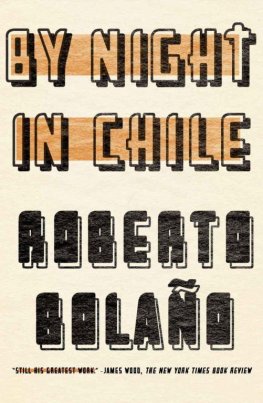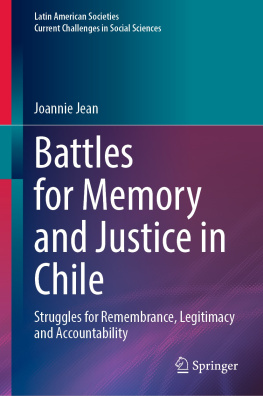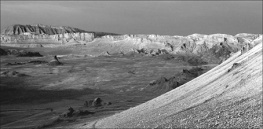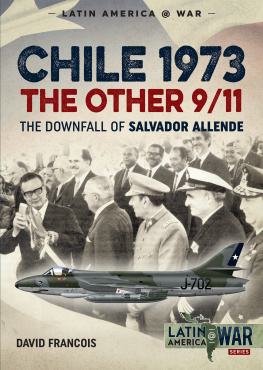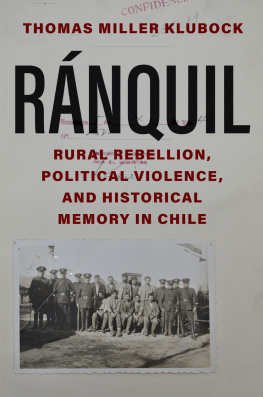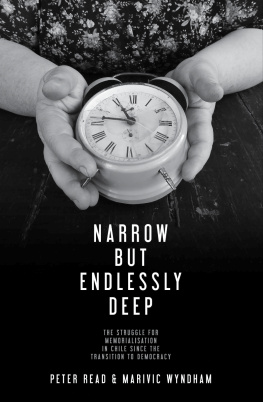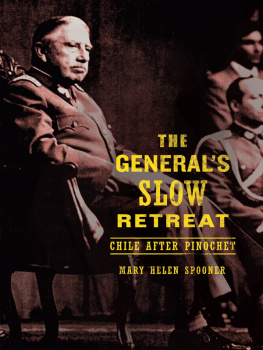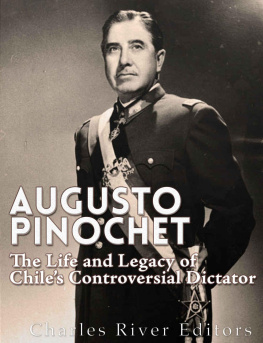
GABRIELA VEGA
Peter Kornbluh directs the Chile Documentation Project at the National Security Archive. His books include The Bay of Pigs Declassified, The Iran-Contra Scandal (with Malcolm Byrne), and The Cuban Missile Crisis, 1962 (with Laurence Chang). He lives in Washington, D.C.
Also by Peter Kornbluh
BOOKS
Talking to Castro: The Hidden History of U.S.-Cuban Diplomacy (with William LeoGrande, forthcoming in 2014)
Pinochet: El Archivo Secreto
Los EEUU y El Derrocamiento De Allende
Bay of Pigs Declassified: The Secret CIA Report on the Invasion of Cuba
The Iran-Contra Scandal: The Declassified History (with Malcolm Byrne)
The Cuban Missile Crisis, 1962 (with Lawrence Chang)
Low Intensity Warfare: Counterinsurgency, Proinsurgency, and Antiterrorism in the Eighties (with Michael Klare)
Nicaragua: The Price of Intervention
DOCUMENT COLLECTIONS
Chile and the United States: U.S. Policy Toward Democracy, Dictatorship, and Human Rights, 19701990
The Cuban Missile Crisis Revisited: An International Collection of Documents, from the Bay of Pigs to the Brink of Nuclear War
The Iran-Contra Affair: The Making of a Scandal, 19831988 (with Malcolm Byrne)
Nicaragua: The Making of U.S. Policy, 19781990
The Pinochet File
A Declassified Dossier
on Atrocity and Accountability

PETER KORNBLUH

NEW YORK
LONDON
2003, 2004, 2013 by the National Security Archive All rights reserved.
No part of this book may be reproduced, in any form, without written permission from the publisher.
Requests for permission to reproduce selections from this book should be mailed to: Permissions Department, The New Press, 38 Greene Street, New York, NY 10013
First published in the United States by The New Press, New York, 2003
This paperback edition published by The New Press, 2013
Distributed by Perseus Distribution
ISBN 978-1-59558-995-8
LIBRARY OF CONGRESS CATALOGING-IN-PUBLICATION DATA
Kornbluh, Peter.
The Pinochet file: a declassified dossier on atrocity and accountability / Peter Kornbluh.
p. cm.
Includes bibliographical references.
1. Pinochet Ugarte, Augusto. 2. ChileHistory1970973Sources.
3. ChileHistory19731988Sources. 4. ChileHistory1988Sources. 5. Human rightsChileHistory20th centurySources. 6. State-sponsored terrorismChileHistory20th centurySources. 7. Subversive activitiesChileHistory20th centurySources. 8. United States. Central Intelligence AgencySources. 9. ChileRelationsUnited StatesSources. 10. United StatesRelationsChileSources. I. Title.
F3101.P56K67 2003
983.06'5dc21
2003050956
The New Press publishes books that promote and enrich public discussion and understanding of the issues vital to our democracy and to a more equitable world. These books are made possible by the enthusiasm of our readers; the support of a committed group of donors, large and small; the collaboration of our many partners in the independent media and the not-for-profit sector; booksellers, who often hand-sell New Press books; librarians; and above all by our authors.
www.thenewpress.com
Composition by Westchester Book Composition
2 4 6 8 10 9 7 5 3 1
Contents
IN MY MEMORY
To my father, Hy Kornbluh, this book is dedicated. He taught me, through parental patience as well as his social and political commitment, the simple meaning of human decency in a world of many ills and evils that could not be ignoredas he made sure I understood. To him I owe the construct of conscience and the sense of common community that has enabled this work from the first page to the last.
It is not a part of American history that we are proud of.
Secretary of State Colin Powell, responding to a question on the morality of the U.S. role in Chile, February 20, 2003
J ust before midnight on October 16, 1998, two Scotland Yard officials slipped through the halls of an elite private clinic in London and secured the room in which former Chilean dictator, General Augusto Pinochet, was recovering from back surgery. With English efficiency, they disarmed his private bodyguards, disconnected the phones, posted eight policemen outside the door, and then proceeded to serve Pinochet with a warrant from INTERPOL. Within minutes, British authorities accomplished what the Chilean courts had refused to do since the end of his military regime in 1990they placed Pinochet under arrest for crimes against humanity.
General Pinochet, whose name became synonymous with gross violations of human rights during his seventeen-year dictatorship, spent 504 days under house arrest in London. Only aggressive diplomatic intervention by Chiles civilian government, pressured by the Pinochetistas in the Chilean military, and an adroit propaganda campaign waged by his lawyers, kept him from being extradited to Spain to stand trial for offenses ranging from torture to terrorism. After sixteen months in detention, the British government released the eighty-four-year-old general on what it termed humanitarian grounds. When he returned to his homeland, however, he was stripped of his immunity from prosecution, indicted, and interrogated. At one point Pinochet even faced the ignominious prospect of being fingerprinted and posing for a mug shot. Initially, the Chilean courts ruled that due to age-related dementia Pinochet could not be put on trial for the abuses committed under his military reign; at the time of his death, however, Pinochet faced multiple indictments.
Pinochet evaded punishment. But the saga of the Pinochet Case remains a historic milestone in the pursuit of accountability over atrocity. His arrest marked a long-awaited vindication for not only Pinochets victims, but the victims of repression everywhere, as well as a turning point in the use of international law to pursue their repressors. It will forever be remembered as a transformational moment for the human rights movement, and a landmark event in both Chile and the United States of America.
For the cause of human rights, the drama of Pinochets detention has established a precedent for the globalization of justice. Now that the Pinochet case has empowered the concept of universal jurisdictionthe ability of any state to hold gross violators accountable to international codes of justicetyrants will no longer be able to leave their homelands and feel secure from the reach of international law. For Chile, Pinochets arrest ended his ability to repress his nations collective memory of the horrors of his rule, and restrain his victims from seeking legal accountability for the crimes committed during his regime. Although Pinochet eluded justice, he did not escape judgment. Moreover, a number of his top military men have been indicted, arrested, and imprisoned since his arrest.
As Chileans continue to resurrect and redress their bloody and buried past, in Washington Pinochets arrest has also led to a massive exhumation of secret U.S. government archives. The declassified Pinochet files not only renewed international interest in the history of his regime; they have refocused public attention on the United Statess own responsibility for the denouement of democracy and the rise of dictatorship in Chile.
Next page

